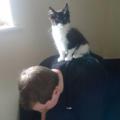matthewmincher@bookwyrm.social ha recensito Outlive di Peter Attia
Stark
4 stelle
I agree with another review here that this book should have a different title / tagline. I would not have picked it up except it was recommended to me.
A high level review of why we should be interested in our healthspan, not our lifespan. Plenty of "common sense but commonly ignored" things that you should consider, the earlier the better.
We should not expect to abuse and fail to maintain our bodies for 40 years and then rely on medicine to "fix" it.
I found this more useful than most self-help books - it aims to challenge and change your mindset.
Every time I read a book with a US centric viewpoint which mentions the yearly MOT people have with their MD, I wonder why we don't have that here.
I agree with another review here that this book should have a different title / tagline. I would not have picked it up except it was recommended to me.
A high level review of why we should be interested in our healthspan, not our lifespan. Plenty of "common sense but commonly ignored" things that you should consider, the earlier the better.
We should not expect to abuse and fail to maintain our bodies for 40 years and then rely on medicine to "fix" it.
I found this more useful than most self-help books - it aims to challenge and change your mindset.
Every time I read a book with a US centric viewpoint which mentions the yearly MOT people have with their MD, I wonder why we don't have that here.




